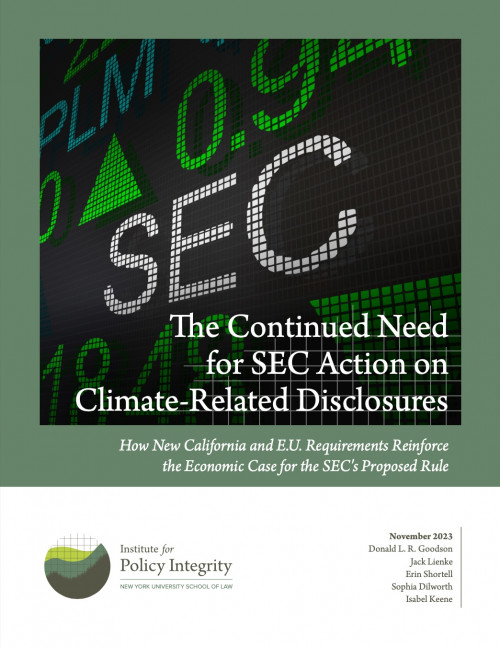-

The Continued Need for SEC Action on Climate-Related Disclosures
How New California and E.U. Requirements Reinforce the Economic Case for the SEC’s Proposed Rule
On March 21, 2022, the Securities and Exchange Commission (SEC) proposed a rule that would require SEC registrants (both domestic and foreign) to provide climate-related disclosures in certain SEC filings. Since the release of the SEC Proposal in March 2022, other jurisdictions, including California and the European Union, have adopted climate-related disclosure regimes. Like many federal rules, the SEC Proposal included an assessment of its costs and benefits. This report examines how the California and E.U. disclosure regimes may affect the baseline for that cost-benefit analysis and, consequently, the SEC’s assessment of the incremental costs and benefits of its proposal. Overall, we find that the new disclosure regimes do not undermine the economic case for the SEC Proposal; if anything, they bolster it.
-
Comments to PHMSA on Proposed Pipeline Safety Initiatives
In September 2023, the Pipeline and Hazardous Materials Safety Administration (PHMSA) proposed a regulation to improve the safety of certain gas pipelines. The standards include a suite of reforms to help prevent incidents like the catastrophic 2018 gas pipeline explosions in Merrimack Valley, Massachusetts. In a comment letter, we explain that, while the Proposed Rule and its accompanying regulatory impact analysis are well grounded in applicable statutes and guidance, PHMSA should take further steps to bolster its analysis.
-
Policy Integrity Work Shapes FTC Ban on Hidden Fees
In October 2023, the Federal Trade Commission (FTC) released a proposed rule that bans the use of “junk fees” in transactions including hotel reservations, vehicle rentals, and event ticket purchases. The proposed rule references Policy Integrity and our work more than a dozen times, including both our 2021 petition for rulemaking and our 2023 comment letter supporting the FTC’s authority to issue this regulation.
-
Comments to EPA on GHG Regulations for Fossil Fuel-Fired Power Plants
In May 2023, EPA proposed a package of regulations to limit greenhouse gas emissions from fossil fuel-fired power plants under Section 111 of the Clean Air Act. This proposal included revisions to strengthen the limits for new gas fired-plants and to establish limits for existing coal-fired plants and some of the largest, existing gas-fired plants. To determine the stringency of these limits, EPA identified “best systems of emission reduction” (BSERs). In our comments we explain how EPA’s has selected BSERs that are traditional in scope and consistent with the legal pathway left intact by the Supreme Court’s decision in West Virginia v. EPA. We also recommend that EPA strengthen the design of the rule to ensure it best fulfills its goal to reduce GHG emissions, which endanger public health and welfare, in a manner that avoids creating perverse incentives.
-
Comments to EPA on Proposal to Strengthen the Mercury and Air Toxics Standards
In April 2023, the Environmental Protection Agency (EPA) proposed to strengthen and update the National Emission Standards for Hazardous Air Pollutants for coal- and oil-fired power plants, also known as the Mercury and Air Toxics Standards (MATS). In this proposal, EPA clearly explained why it revised the technology review conducted in 2020 and made the emissions standards more stringent on the basis of developments in control technologies. In our comments, we recommended improvements to the proposed update and highlighted areas where EPA's analysis succeeded. -
Comments to EPA on Proposed Rule to Strengthen Power Plant Effluent Guidelines
In March, the Environmental Protection Agency (EPA) proposed to strengthen its power plant effluent guidelines by tightening discharge requirements for flue gas desulfurization wastewater, bottom ash transport water, and combustion residual leachate resulting from steam electricity generation. In our comment letter, we offer several recommendations for EPA to strengthen its consideration of regulatory benefits.
-
Amicus Brief on Major Questions Doctrine in Loan Settlement Case
We filed an amicus brief in a Ninth Circuit loan settlement case in support of neither party to address the proper application of the major questions doctrine. Our brief takes no position on whether the major questions doctrine ultimately applies to the case, nor does it take a position on how the Ninth Circuit should ultimately decide the case. It does explain that, although the Supreme Court’s major questions precedents often reference the economic significance of an agency’s action, none of the Supreme Court’s precedents, including West Virginia, turns on this factor.
-
Comments to the CPSC on Chronic Hazards Associated with Gas Ranges and Proposed Solutions
In March 2023, the Consumer Product Safety Commission (CPSC) published a Request for Information on Chronic Hazards Associated with Gas Ranges and Proposed Solutions. We submitted comments which highlighted the major findings from our report. We explained how the CPSC could regulate gas ranges and recommened possible futher actions.
-
Comments to FTC on Unfair or Deceptive Fees Trade Regulation
On October 20 2022, the FTC voted to grant the Institute for Policy Integrity’s petition for rulemaking and issue an Advanced Notice of Proposed Rulemaking on Unfair or Deceptive Fees Trade Regulation Rule. Commissioner Christine S. Wilson issued a dissenting statement in which she raised major questions doctrine concerns and asked for precedent that supports FTC's authority to promulgate this rule. We submitted a letter responding to Commissioner Wilson’s concern and providing regulatory antecedents supporting the FTC’s authority. In this letter, Policy Integrity shows that FTC's rule would not be unheralded nor represent a transformative change in the agency's authority, and therefore, it would not implicate the major questions doctrine.
-
Comments to Department of Transportation on Airline Ticket Refunds
DOT recently proposed a rule that would require airlines to issue refunds or non-expiring vouchers to consumers whose flights are significantly delayed or canceled or who decide not to travel for certain health reasons. Policy Integrity submitted comments in support of the proposal, and made recommendations to clarify and strengthen the final rule.
Viewing recent projects in Consumer and Healthcare Protection








